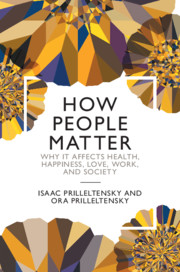Introduction
Published online by Cambridge University Press: 20 May 2021
Summary
Connections that help us feel valued and add value impact our health, happiness, love, work, and society. The consequences of mattering or not mattering can be seen everywhere, at every age. The lack of mattering often results in depression, suicide, and even aggression and xenophobia. People who suffer from depression, workers who feel alienated, and citizens whose identity is threatened feel devalued. They feel that their lives, work, and identity do not matter. While some respond to this situation by internalizing feelings of despondence, others overcompensate by nurturing feelings of superiority and joining nationalistic movements headed by authoritarian leaders. Feeling devalued or overvalued, in relationships, at work, and in the world, is one of the most serious threats facing us. They derive from a failure to foster mattering. They results can be disastrous for individuals and society as a whole. When disaffected masses feel that their identity is devalued in society, they respond in one of two ways. They either turn toward nationalism and extremism, as in the case of xenophobic movements, or they protest to defend their rights.
Keywords
- Type
- Chapter
- Information
- How People MatterWhy it Affects Health, Happiness, Love, Work, and Society, pp. 1 - 8Publisher: Cambridge University PressPrint publication year: 2021

